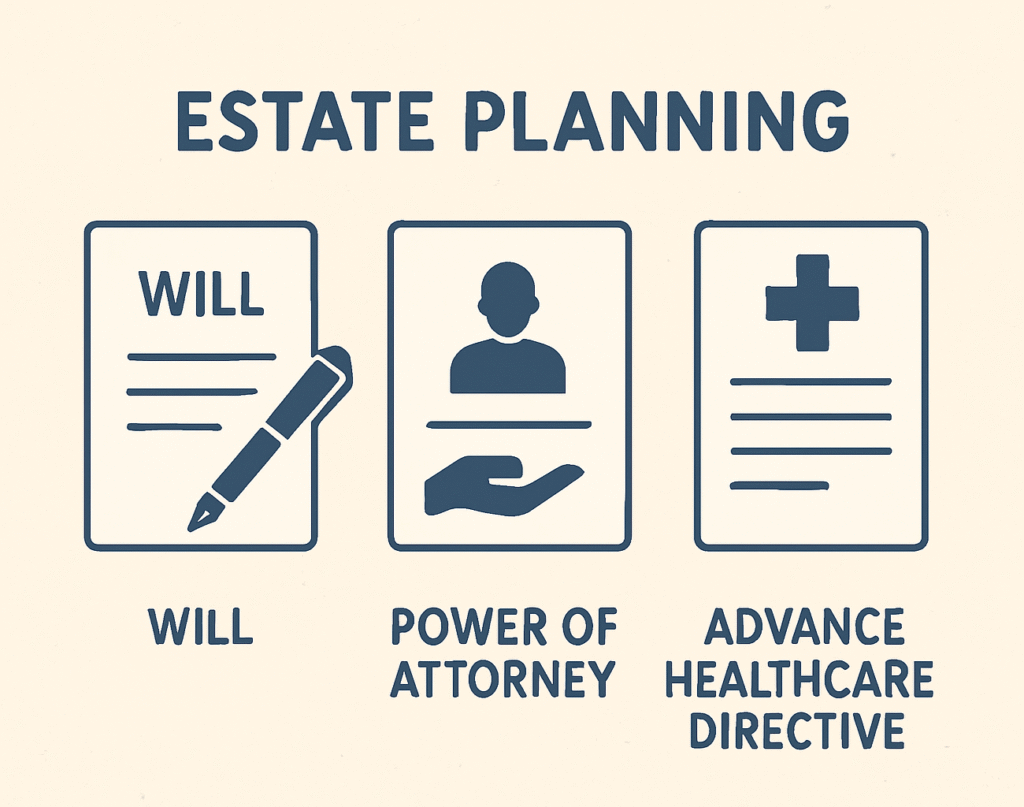Estate planning isn’t just about leaving money behind—it’s about making sure your wishes are honored, your family is protected, and your legacy is preserved. Three of the most essential documents in any solid estate plan are a will, a power of attorney (POA), and an advance healthcare directive (AHD). Without them, your loved ones may face unnecessary legal battles, financial complications, and emotional stress.
Why a Will is Essential
A will is the foundation of your estate plan. It specifies how your assets—your home, savings, investments, and treasured belongings—will be distributed after your passing. Without a will, your estate will be settled according to state laws, which may not align with your wishes.
What Happens If You Don’t Have a Will?
Consider the case of music legend Prince, who passed away without a will. His estate, valued in the hundreds of millions, became entangled in legal disputes that lasted years and cost his heirs a significant portion of their inheritance. While most of us don’t have rockstar-level wealth, the consequences of not having a will can be just as damaging—delayed asset distribution, unnecessary legal costs, and even family conflicts.

A common misconception is that everything automatically goes to a surviving spouse. While some assets may transfer directly to a spouse, many do not. If you pass away without a will, state laws dictate how your estate is divided, and in many cases, assets are split between a spouse and children or other relatives, which can create unnecessary complications and financial strain.
As a financial planner with over 20 years of experience, I’ve seen firsthand how this misconception impacts families. Many widows, already grieving the loss of their spouse, are shocked to learn they must go before the court to access funds they assumed were theirs. This legal hurdle adds unnecessary stress at an already difficult time, making an emotional process even more overwhelming.
Additionally, naming minors as beneficiaries in a will can create unintended legal challenges. If a minor inherits assets directly, the court may take control over those assets until the child reaches adulthood. That means a judge could ultimately decide how and when those funds are used—potentially delaying access for important needs like education or healthcare.
A well-drafted will ensures:
- Your assets go to the people and causes you care about.
- Your family avoids lengthy court processes.
- You name a guardian for minor children or dependents, if applicable.
The Power of a Power of Attorney (POA)
A power of attorney is just as vital. It allows someone you trust to make financial decisions on your behalf if you become incapacitated. Many people assume their spouse or adult children automatically have this authority, but that’s not always the case.
Financial Power of Attorney
This document gives your chosen person the authority to pay bills, handle investments, or manage real estate if you’re unable to do so yourself. Without it, your family might have to go through a complicated and expensive legal process to access essential accounts or make time-sensitive decisions.
Imagine a retired business owner who suffers a stroke and can’t manage their financial affairs. Without a POA in place, their family could be stuck waiting on court approval just to keep the lights on or pay for care.
Advance Healthcare Directive (AHD): Making Medical Wishes Clear
An Advance Healthcare Directive (AHD) outlines your medical care preferences and appoints someone you trust to make healthcare decisions if you’re unable to speak for yourself. This is more than just a form—it’s a gift to your family, sparing them from the agony of guessing what you’d want in a critical moment.
The story of Terri Schiavo is a heartbreaking reminder of what can happen when these wishes aren’t made clear. A 15-year legal battle between her husband and parents could have been avoided with an AHD in place. This one document can help prevent family rifts and ensure that your medical care reflects your values, not courtroom rulings.
With an AHD, you can:
- Specify your preferences for life-sustaining treatment.
- Appoint a healthcare agent to make decisions for you.
- Ensure your medical wishes are respected.
Estate Planning Is Not Just for the Wealthy

Let’s clear up a myth—estate planning isn’t just for the wealthy. If you own a home, have a bank account, or care about what happens to your family, these documents matter. A will, POA, and AHD are about peace of mind and control—not just dollars and cents.
Take Action Today
Putting a will, POA, and AHD in place isn’t something you do for yourself—it’s something you do for your loved ones. These documents:
- Protect your assets and ensure they’re distributed according to your wishes.
Prevent financial and legal complications for your family. - Allow trusted individuals to make important financial and healthcare decisions on your behalf.
If you haven’t tackled this yet, now’s the time. Talk to an estate planning professional to create a plan that protects what matters most—your family, your legacy, and your peace of mind.
Life is unpredictable, but a solid estate plan provides certainty when it’s needed most.




